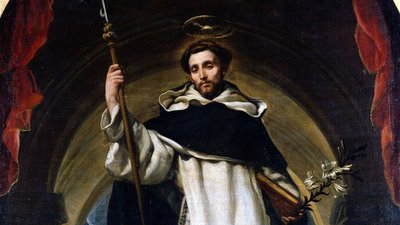Thoughts for the Day
Friday, 8th August 2025: Dominic, Priest, Founder of the Order of Preachers, 1221
Gnosticism Ecclesiasticus 39 Saint Dominic Heresy Saint
Reading : Verses from Ecclesiasticus, Chapter 39

How different the one who devotes himself
to the study of the law of the Most High!
He seeks out the wisdom of all the ancients,
and is concerned with prophecies;
he preserves the sayings of the famous
and penetrates the subtleties of parables;
he seeks out the hidden meanings of proverbs
and is at home with the obscurities of parables.
He serves among the great
and appears before rulers;
he travels in foreign lands
and learns what is good and evil in the human lot.
He sets his heart on rising early
to seek the Lord who made him,
and to petition the Most High;
he opens his mouth in prayer
and asks pardon for his sins.
If the great Lord is willing,
he will be filled with the spirit of understanding;
he will pour forth words of wisdom of his own
and give thanks to the Lord in prayer.
The Lord will direct his counsel and knowledge,
as he meditates on his mysteries.
He will show the wisdom of what he has learned,
and will glory in the law of the Lord’s covenant.
Many will praise his understanding;
it will never be blotted out.
His memory will not disappear,
and his name will live through all generations.
Nations will speak of his wisdom,
and the congregation will proclaim his praise.
(Lectionary, New Revised Standard Version)
Thoughts
Today we remember Saint Dominic, one of those who studied the scriptures and who taught their generation, and us, about our Lord. He was born at Calaruega in Castile, in 1170 CE. Dominic became an Augustinian or Austin Friar and led a disciplined life of prayer and penance. He became prior in 1201, but three years later, whilst on a trip to Denmark with his bishop, he passed through France and came across Cathars or Albigenses. They claimed to be Christians but held the belief that flesh and material things were evil, that the spirit was of God and that flesh and spirit were in permanent conflict. Dominic formed an Order of Preachers to combat this belief, although he would have nothing to do with the vengeful Crusade that began to be waged against the Albigenses. The Dominican Order spread to many countries in just a few years and did much to maintain the credibility of the faith in late-medieval Europe. Dominic died on this day at Bologna in 1221. (From 'Exciting Holiness')
Oh dear, we're back at the heresy about spirit being good and the body evil called Gnosticism. It was to take the early church some centuries to sort it out, and periodically it flared again as we see in the life of Saint Dominic. Indeed it even played a part in the controversy concerning women priests in the 1990s, and can still occur today in another disguise where people cannot believe that Jesus was actually a real human being. For a good explanation of Gnosticism see Further Thoughts below.
Our reading comes from 'Ecclesiasticus' or 'The Book of Sirach' written sometime between 196 and 175 BCE, in Hebrew, at the time of the Second Temple built 70 years after the Babylonians destroyed Solomon's Temple. It's one of those books in the Apocrypha (that come between the Old and New Testaments). Most of these books have been accepted by the Catholic Church for centuries, but it's only recently that some of the Protestant churches have included them in the Lectionary of lessons. Today's reading has some wise words that preachers and teachers should take to heart.
Prayer
Collect
Almighty God,
whose servant Dominic grew in the Knowledge of Your truth
and who formed an order of preachers
to proclaim the faith of Christ:
by Your grace give to all Your people a love for Your word
and a longing to share the gospel,
so that the whole world may come to know You
and Your Son Jesus Christ our Lord,
who is alive and reigns with You,
who is alive and reigns with You,
in the unity of the Holy Spirit,
one God, now and for ever.
Amen,
You might like to remind yourself about this heresy:
- Gnosticism simply put (Barry Cooper)
Or the Second Temple: